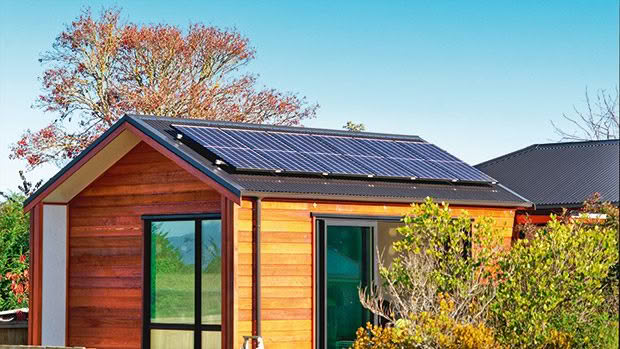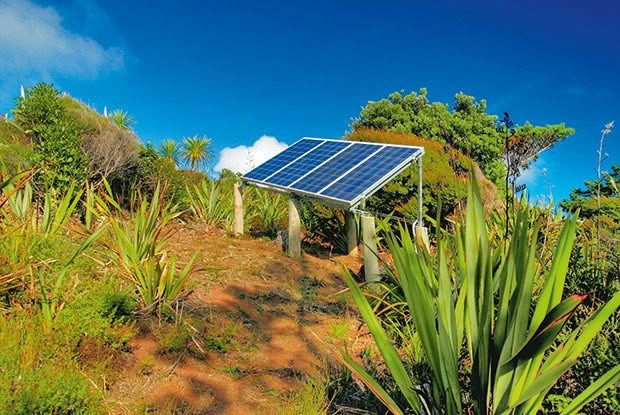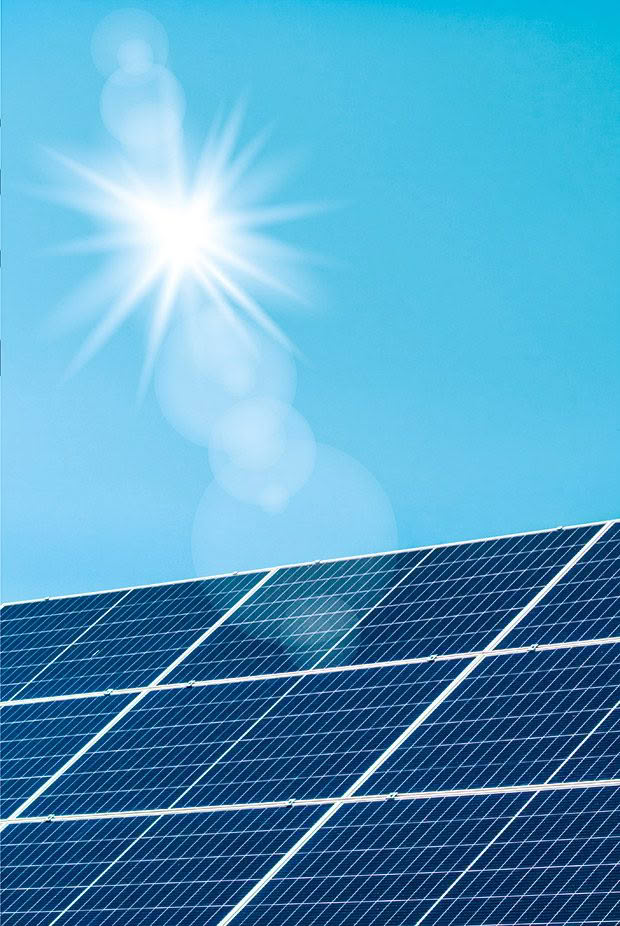10 things you need to know about going off-grid

Is going off the grid the best decision? It can be a complicated question, especially if you’re already connected to the grid.
Words: Nadene Hall
DEFINITIONS
SAPS: stand-alone power system, another way to say off-grid.
PV: a photovoltaic cell or solar panel is a unit that converts sunlight into electricity.
SEANZ: the Sustainable Energy Association of NZ represents many of the suppliers and installers of micro-generation equipment in NZ.
An investment in off-grid power can be cost-effective depending on technology, the system you require, and how you use it.
If you’re building from new in a rural area, it may be a more economical option if you live more than a couple of hundred metres from power lines. The expense of a cable or overhead power lines, a contribution (or the full price if you’re unlucky) towards a transformer, and connection to the grid can cost significantly more than setting up your own energy production system.
Here are 10 things you need to know if you’re thinking about using solar for energy.
1. It’s not for everyone
If you want to go off-grid to reduce greenhouse gas emissions in your current, on-grid home, you may find you can save more money by:
• switching to an electric or more fuel-efficient vehicle;
• upgrading your home’s thermal envelope by improving insulation and double-glazing windows.
That’s because NZ’s electricity system is already mostly renewable energy, with about 80% of the country’s power generated from hydro, geothermal, and wind.
It’s also important to work out if:

• you get enough sun;
• panels can be placed at the best angle for good generation;
• your household can handle being more efficient – there are often limits to what sort of appliances you can run and when;
• it’s economical. Factors include:
– how much power the panels generate;
– how much of the power you use;
– how much power you sell back to the retailer;
– how much power prices and buy-back rates rise or fall over the lifetime of your panels;
– interest charged on money borrowed to buy the system;
– interest lost on savings used to buy the system.
2. Even if you have solar panels, you probably won’t be entirely off-grid
Most New Zealand houses retrofitted with solar panels stay connected to the grid.
The benefits are:
• there’s no need to buy batteries as any spare power you generate goes back into the grid;
• when the system doesn’t generate enough electricity – mostly at night – you can use the grid to run your home.
However, the amount you get paid for the power you contribute back into the grid isn’t as much as it costs to use it.
3. If you want to save the most money, you’ll never leave home
A solar power system is better value if:
• you’re at home during the day using the power you generate to run appliances (washing machine, dishwasher, vacuum cleaner etc);
• you have big power-using options you can run during the day, such as charging an electric vehicle, heating/running a swimming pool or spa.
4. A solar system won’t last forever
The life expectancy of a solar panel is 25 years, with minor maintenance. The amount of electricity it generates reduces over time as the panel degrades, so check warranty details.
It’s likely you’ll also need to replace the system’s inverter during the panels’ lifetime (read more on page 24).
5. Getting warmer
Around 30% of the energy used by the average household is for heating water. An efficient wood burner with a wetback can heat your home and water, and is often a good option to complement solar power.

A wetback is a series of pipes that run through the back of a firebox. Water from the hot water cylinder circulates through it and is heated by the fire. Some systems use a small pump; others work by gravity. Ideally, the hot water cylinder is sitting just behind or as close as possible to
the fire.
Adding a wetback means less of a fire’s heat is going out into the room so it’s important to ensure your wood burner has the capacity to do both.
Not all wood burners and hot water cylinders are suitable for a wetback so check before you buy.
6. How to get top panel performance
Panels should be cleaned periodically to remove dirt and other debris such as leaves – you may need a contractor to do this depending on how difficult it is to access them. Panels will stay clean for a long time in areas with high rainfall and better air quality.
Trees that shade your panels should be trimmed.
7. The dark side
Solar panels don’t generate electricity at night and produce less in the winter. To use electricity after dark, you’ll need to buy it (from the grid) or have a battery system at an additional cost. The cost of batteries is quite high and may make it uneconomical to install a solar system if you’re already connected to the grid.
8. You won’t make a profit from your power supplier
If you feed surplus power into the grid, your power company will pay you for it. However, buy-back rates (around 7-8¢ per kWh) are lower than the cost of buying electricity, so you get better value from using the energy you generate yourself. Shop around to find the best deal as electricity prices may change.
9. Location, location, location
Solar panels are usually installed on roofs at the angle of the roof – ideally facing north, receiving direct sunlight all day – but can also be placed on facades, conservatory roofs, sunshades, garages, or specially built stands on the ground. Ground stands improve the panels’ angle, but sometimes their cost can outweigh the added benefits.
Talk to a solar expert about the best option, which could include more panels depending on the conditions.
10. Calculate your solar potential
There are two good online tools to help you calculate if going off the grid is a good idea for your location. Consumer magazine recommends using them both and comparing the results, as they’re based on different assumptions: Gen Less Tools and the Sustainable Energy Association New Zealand solar optimiser.
Love this story? Subscribe now!
 This article first appeared in NZ Lifestyle Block Magazine.
This article first appeared in NZ Lifestyle Block Magazine.
